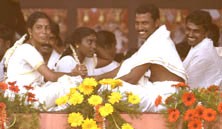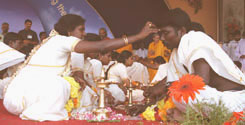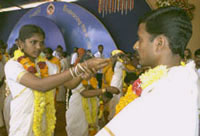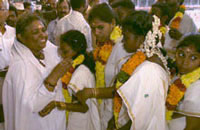Amma Marries More Than 150 Impoverished Couples
27 September 2003
In India, the cost of marriage is often heightened by dowry, a sum of money or a piece of property that the bride’s family pays to the groom’s. This has made marriage increasingly unaffordable for the poor. Often, in their efforts to pay for the wedding ceremony and dowry, the parents of the bride sink into debt. Amma has spoken out against the dowry system on a number of occasions, including Her 2002 speech at the Conference of Women Religious & Spiritual Leaders in Geneva.
During the planning of Amritavarsham50, Amma decided She would marry 108 poor couples on Her birthday in a mass wedding, with the Math providing all the necessary items. A traditional Indian wedding requires an oil lamp and other puja items, garlands, flowers, gold wedding rings and taalis [gold necklaces], gold earrings and gold bangles, white-and-gold clothing and sweets.
Actually, making such arrangements was nothing new for Amma. In 1980, when Amma only had a handful of disciples, the marriage costs and arrangements of Her sisters’ weddings fell on Her shoulders. Though Amma had no money, Her faith was that God would provide the necessary items, and, sure enough, the marriages went off without complications.
It was out of Amma’s compassion for the poor that She decided to marry the 108 couples. And as that compassion knows no bounds, in the end Amma could not limit the wedding to 108 couples alone—more than 150 couples took part in the ceremony. The couples were selected from carefully screened applications sent to the Math in response to advertisements place in newspapers throughout India.
Although the number had increased from 108 to more than 150, Amma wished She could have included even more couples in the mass ceremony. On the day of Her birthday, with the sea of brides and grooms before Her, Amma explained how too many applications had come in, and that She regretted that the Math had not been able to consider them all. “In future, Amma will definitely consider these applications and perform more marriages. Amma would very much love to continue this as an offering to society.”
The couples sat before Amma in the traditional dress—the brides wore cream-coloured saris lined with gold trim, and the men, the same style of shawls and dhotis [long cloth worn around the waist]. In between each couple was a brass oil lamp, its wick burning softly. Amma first addressed the audience, asking them to bless the couples by praying for their material and spiritual prosperity.
She next asked the couples to pray. She instructed the grooms to apply sandal paste and kumkum [saffron powder] to the brides’ foreheads. The brides were then directed to apply the same to the grooms. The brides then slipped the wedding rings on their grooms’ fingers, after which, the grooms tied the taalis around their brides’ necks. The audience trilled their tongues enthusiastically!
Then, Amma instructed the women to fervently pray that their husbands would enshrine them in their hearts and never leave them. Similar instructions were given to the husbands. Then the brides and grooms worshipped each other as embodiments of the Divine. They performed arati, waving a burning camphor flame before each other, and prostrated at each other’s feet. Before the ceremony was over, Amma reminded the men that their wives were not separate from God. “They are goddesses, mothers, friends and wives,” She said.
Finally, Amma asked the newly married couples to feed each other some pudding made of milk and banana, a symbolic prayer for their married lives to be filled with sweetness. The husbands then led their wives around the oil lamps thrice.
The couples that Amma had married believed they were twice blessed. Not only had they been joined in a beautiful traditional marriage that they otherwise could not have afforded, but also their bond had been solemnised by Amma, a Mahatma. The joy on their faces shined brightly, as they came to Her for darshan.





